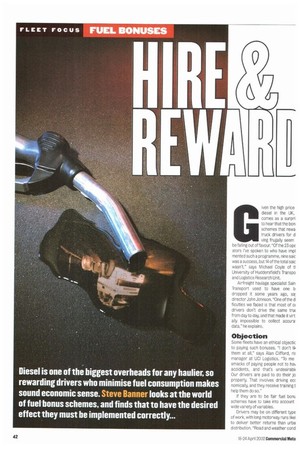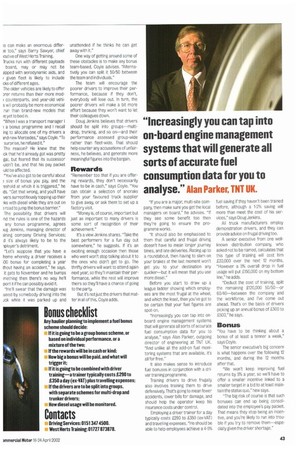G iven the high price diesel in the UK, comes as
Page 42

Page 43

If you've noticed an error in this article please click here to report it so we can fix it.
a surpri to hear that the bon schemes that rewa truck drivers for d ving frugally seem be falling out of favour. "Of the 23 op€ ators I've spoken to who have impl mented such a programme, nine saic was a success, but 14 of the total saic wasn't," says Michael Coyle of ti University of Huddersfield's Transpo and Logistics Research Unit.
Airfreight haulage specialist Sain Transport used to have one b dropped it some years ago, sa director John Johnson. "One of the d ficutties we faced is that most of oi drivers don't drive the same trui from day to day, and that made it virt ally impossible to collect accura data," he explains.
Objection
Some fleets have an ethical objectic to paying such bonuses. "I don't HI, them at all,' says Alan Clifford, ri;. manager at UCI Logistics. "To me smacks of paying people not to ha accidents, and that's undesirabli Our drivers are paid to do their jo properly. That involves driving ecr nomically, and they receive training t help them do so."
if they are to be fair fuel bonu schemes have to take into account wide variety of variables.
Drivers may be on different type of work, with long motorway runs likel to deliver better returns than urba distribution. "Road and weather cond is can make an enormous differ* too," says Barry Sawyer, chief :cutive of West Herts Training.
Trucks run with different payloads board, may or may not be upped with aerodynamic aids, and given fleet is likely to include cks of different ages.
The older vehicles are likely to offer arer returns than their more modcounterparts, and year-old vehis will probably be more economical run than brand-new models that fe yet to bed in.
"When I was a transport manager I a bonus programme and I recall ing to allocate one of my drivers a Ind-new Mercedes," says Coyle. "To surprise, he refused it."
The reason? He knew that the ick that he'd already got was pretty gal, but feared that its successor iuldn't be, and that his pay packet iuld be affected.
"You've also got to be careful about ; size of bonus you pay, and the *shold at which it is triggered," he ds. "Get that wrong, and you'll have ivers surreptitiously topping up their iks with diesel while they are out on :road to jump the bonus barrier." The possibility that drivers will nd the rules is one of the hazards any bonus programme, agrees iug Jenkins, managing director of lining company Driving Services; d it's always likely to be to the iployer's detriment.
"Let's suppose that you have a heme whereby a driver receives a 00 bonus for completing a year thout having an accident," he says. it gets to November and he bumps imething then there's no way he'll port it if he can possibly avoid it. "He'll swear that the damage was used by somebody driving into the uck while it was parked up and unattended if he thinks he can get away with it."
One way of getting around some of these obstacles is to make any bonus team-based, Coyle advises. "Alternatively you can split it 50/50 between the team and individuals."
The team will encourage the poorer drivers to improve their performance, because if they don't, everybody will lose out. In turn, the poorer drivers will make a bit more effort because they won't want to let their colleagues down.
Doug Jenkins believes that drivers should be split into groups—multidrop, trunking, and so on—and their performance assessed group-wide rather than fleet-wide. That should help counter any accusations of unfairness, he believes, and generate more meaningful figures into the bargain.
Rewards
"Remember too that if you are offering rewards, they don't necessarily have to be in cash," says Coyle. "You can obtain a selection of anoraks from your favoured truck supplier to give away, or ask them to set up a factory visit.
"Money is, of course, important but just as important to many drivers is some sort of recognition of their achievement."
It's a view Jenkins shares. "Take the best performers for a fun day out somewhere," he suggests. If it's an exciting enough occasion then those who went won't stop talking about it to the ones who didn't get to go. The thrifty drivers will want to attend again next year, so they'll maintain their performance, while the rest will improve theirs so they'll have a chance of going to the party.
But it's not just the drivers that matter in at of this, Coyle adds.




























































































































































